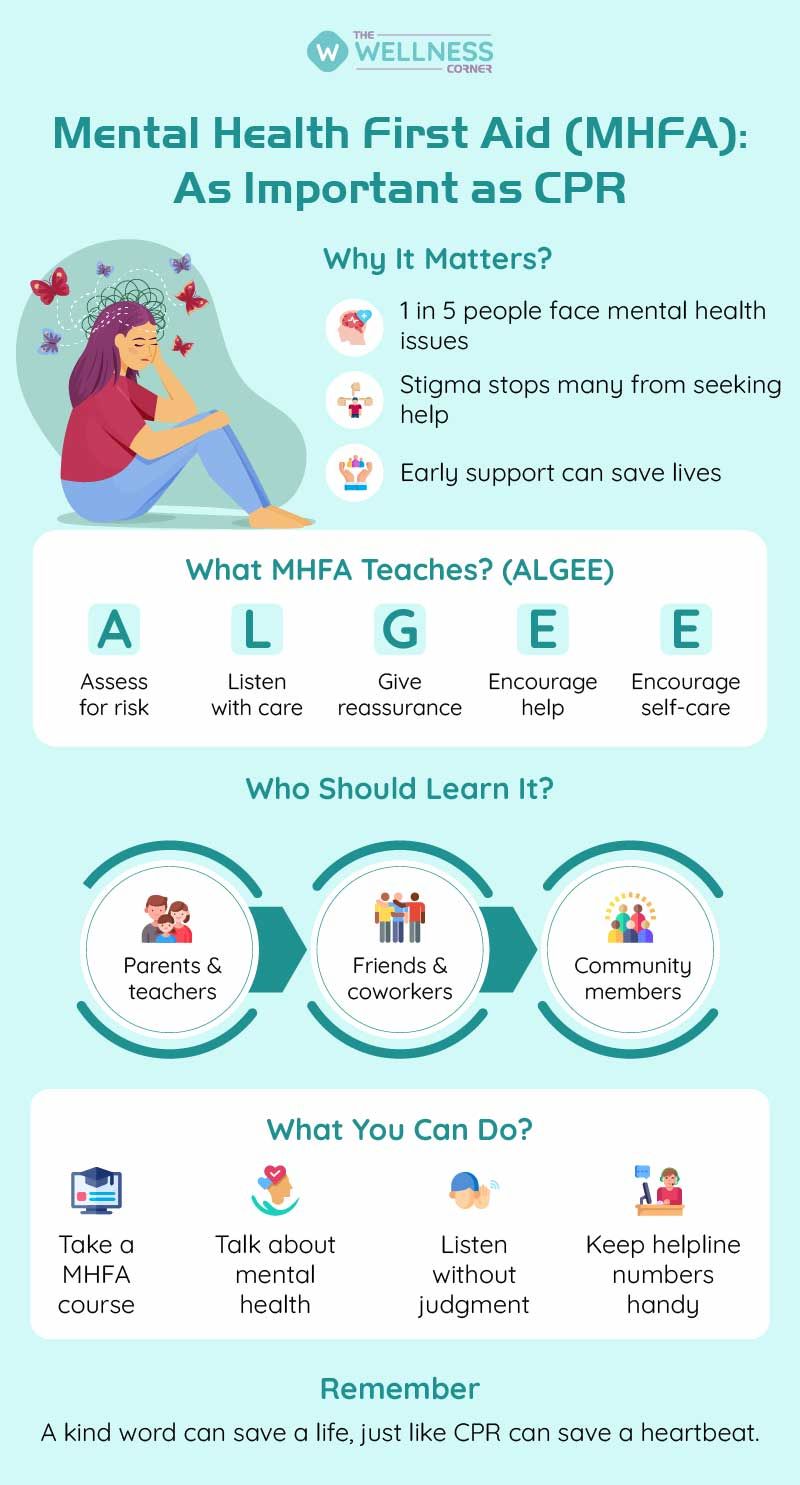Mental Health First Aid: Why It Should Be As Common As CPR?
6 hours ago
4 minute read.

Imagine this: You’re sitting with a friend at a café. In the middle of your conversation, they suddenly clutch their chest and collapse. You wouldn’t hesitate, right? You’d call for help, maybe perform CPR if you knew it, and do everything possible to keep them alive until professionals arrived.
Now imagine a different scene. That same friend starts crying uncontrollably, saying they feel like life isn’t worth living anymore. Your heart races, your mind freezes. You want to help, but you don’t know how. So maybe you change the subject, say “you’ll be fine,” or awkwardly suggest a distraction.
This difference is exactly why Mental Health First Aid (MHFA) should be as common as CPR.
We’re taught how to respond to a broken body, but not a breaking mind. Yet both can be life-threatening.
Also Check: Simple Ways To Take Care Of Your Mental Health

What Is Mental Health First Aid, Really?
Mental Health First Aid is not about turning you into a therapist or diagnosing disorders. It’s about giving you the confidence to:
- Recognize when someone is struggling emotionally
- Approach them with empathy instead of judgment
- Provide immediate support in the moment
- Encourage them to seek professional help
Think of it as CPR for the mind. Just like CPR keeps the heart beating until medical care arrives, MHFA keeps someone safe, seen, and supported until they can get professional help.
Why It Matters More Than Ever?
Mental Health Crises Are Everywhere
You may not realize it, but chances are you already know someone silently struggling—maybe a co-worker overwhelmed by stress, a teenager fighting depression, or a friend quietly dealing with addiction.
Statistics tell us 1 in 5 adults experiences a mental health condition each year. That’s not “someone out there”—it’s people in our homes, our offices, our classrooms.
Stigma Is Still Powerful
Here’s the hard truth: many people don’t seek help because they fear being judged. They’re scared others will see them as “weak” or “unstable.” When you know MHFA, you can be the safe person they turn to—the one who listens without shame or labels.
Sometimes, a single compassionate conversation can be the first step toward healing.
Early Help Changes Lives
We all know that catching a physical illness early makes recovery easier. Mental health is no different. A little support, offered early, can prevent someone’s anxiety from spiraling into panic disorder or stop depression from sliding into suicidal thoughts.
MHFA teaches you how to notice the red flags and act before things become a crisis.
It Builds Stronger Communities
Think about it: wouldn’t you feel safer knowing people around you could step in during a mental health emergency, just like they would in a physical one?
Imagine schools where teachers recognize early warning signs in students, workplaces where managers know how to handle burnout with care, or families where members feel safe talking openly about their struggles.
This is the kind of compassionate culture MHFA can create.
CPR vs. MHFA: More Alike Than You Think
- CPR saves a life during a heart crisis. MHFA can save a life during a mental health crisis.
- Neither requires years of training—just a short, practical course.
- Both give everyday people the power to act when it matters most.
- Both are skills you hope you’ll never need, but you’re grateful to have.
If we truly believe mental health is as important as physical health, then learning MHFA should be as routine as learning CPR.
What Does Mental Health First Aid Training Teach?
Most MHFA courses focus on a simple, step-by-step action plan (often remembered as ALGEE):
- Assess for risk of harm or suicide
- Listen non-judgmentally
- Give reassurance and information
- Encourage professional help
- Encourage self-help strategies
These aren’t complicated medical terms—they’re skills any of us can learn. Skills that could make the difference between hope and despair for someone in pain.

Who Should Learn It?
Honestly? Everyone. But some groups can make an even bigger impact:
- Parents and caregivers, who notice changes first
- Teachers, who see children and teens daily
- Workplace leaders, who manage stressed employees
- Friends and peers, because people usually open up to those they trust
- Community members, because help often comes from the nearest person, not the nearest professional
The more people trained, the more lives supported.
Also Check: Creating A Workplace That Supports Mental Health
Why It Should Be as Common as CPR?
- Because both physical and mental crises can kill.
- Because both require quick, calm action.
- Because both are about one human stepping up for another.
- Because both remind us that saving lives isn’t just a doctor’s job—it can be anyone’s.
We wouldn’t dream of saying, “Sorry, I don’t know CPR, so I’ll just walk away.” So why do we accept that when the emergency is emotional instead of physical?
What You Can Do Today?
- Take a course. Many organizations offer certified MHFA programs (some even online).
- Talk about it. Encourage your workplace, school, or community to make training available.
- Practice empathy. Even before training, you can listen without judgment and check in with loved ones.
- Know resources. Keep helpline numbers and support services handy—you never know when you’ll need them.
A Final Thought
When a heart stops, seconds matter. When a mind is breaking, moments matter too. We’ve normalized CPR because we value physical survival. Now it’s time to normalize Mental Health First Aid—because emotional survival is just as important.
You may never need to use MHFA. But if the day comes when a loved one whispers, “I don’t think I can go on,” you’ll be ready. And your response could be the reason they choose to stay.
Leave a Comment
Related Articles
Health Checks @ Home
Service
Explore
© 2025 Truworth Health Technologies Pvt. Ltd.




